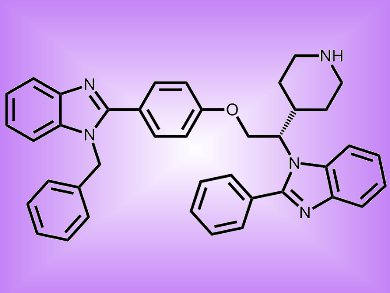The GTPase KRAS plays a crucial role in the development of numerous tumors. It activity depends on interaction with the cellular membrane, an event regulated by farnesylation – addition of a 15-carbon farnesyl lipid tail. As a consequence, in order to block KRAS, a number of farnesyltransferase inhibitors have been developed. None of these drugs, however, showed clinical efficacy.
This issue prompted Gunther Zimmermann and colleagues, Max Plank Institute of Molecular Physiology, Dortmund, Germany, to hamper KRAS activity using a novel strategy. The researchers designed a small molecule, deltarasin (pictured), which selectively inhibits PDEδ. PDEδ is a protein that binds to KRAS’ farnesylated moiety and thereby regulates its interaction with the membrane. In doing so, the scientists obtained a compound which reduced tumor growth in mice by successfully inhibiting KRAS.
Deltarasin may, therefore, offer novel hopes to target KRAS pharmacologically.
- Small molecule inhibition of the KRAS–PDEδ interaction impairs oncogenic KRAS signalling,
G. Zimmermann, B. Papke, S. Ismail, N. Vartak, A. Chandra, M. Hoffmann, S. A. Hahn, G. Triola, A. Wittinghofer, P. I. H. Bastiaens, H. Waldmann,
Nature 2013, 497 (7451), 638–642.
DOI: 10.1038/nature12205




